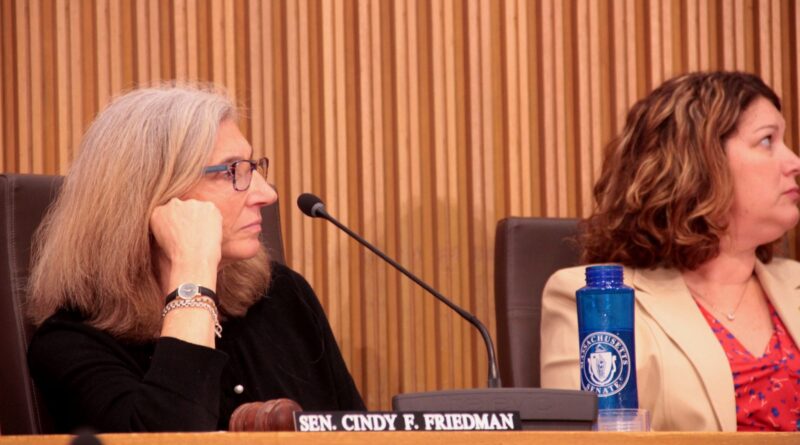The leader of the Senate says Mass. health care ‘very poor now’
COMPLIANCE COMPATIBILITY MELEPI The bankruptcy scandal has revealed several major cracks in Massachusetts’ health care system, but so far the House and Senate have not been able to reach an agreement on what the state’s response should be.
“What I do know is that our health system is very weak right now,” Sen. Cindy Friedman, of Arlington, said at The Codcast event hosted by Paul Hattis of the Lown Institute and John McDonough, professor at TH Chan. Harvard School of Public Health.
“If you look at all of our hospitals, even our financially sound ones, they’re all struggling,” said Friedman, chairman of the Senate Joint Committee on Health Care Finance. “All of our health care facilities are struggling. And I’m not just trying to clean up a few pockets here and there. They’re really struggling. The cost of health care is more than anyone I think. He didn’t think so, especially since Covid. So no one has a good situation.”
He said that even insurers are in a precarious position. Following the collapse of negotiations between hospitals and Point32 Health, as many as 40,000 patients could lose access to their primary care doctors and specialists. In the podcast, Friedman said he had just received a call about Blue Cross Blue Shield removing a thousand people from their Medicare Advantage plan, “telling everyone, ‘Go find another insurance.’ .’
On the other hand, Friedman said, pharmaceutical companies and herbal supplement managers seem to be doing very well.
Hattis asked Friedman about the prospects for the new health care reform law, which stalled along with other major policies after the recent legislative session. Speaker Ron Mariano, Hattis noted, recently said the House and Senate hospital care bills “are being discussed” but the bills “are not going the way we would like them to go.”
There was little insight into horse trading. Rep. John Lawn, chairman of the House Joint Committee on Health Care Finance, did not respond to Hattis and McDonough’s request to appear on The Codcast.
Friedman said the Senate leadership has “reached out” and “we are committed to engaging in deep and thoughtful discussions to understand where we both stand and what our priorities are. But we are committed to something.”
He did not delve deeply into the “sticky things” between the rooms that the receptionists were pressuring him into. But Friedman said “he could argue that if we don’t bring pharmaceutical companies to the table and their cost structures in a meaningful way, I think we’re missing the mark. Because now they’re the big growers of health dollars.”
Friedman added that if the government doesn’t establish some way to ensure protection from private groups trying to take over health care organizations, “I’m not sure what we’re going to do.” what will be meaningful.”
McDonough pushed Friedman on the law enforcement itself, which has come under particular scrutiny this year in light of State Auditor Diana DiZoglio’s pursuit of a ballot question allowing her office to audit the Legislature.
Friedman said the Senate is comfortable with the publicity committee vote and conducts a budget review every year. He suggested that good law-making involves legislators having open discussions in the public eye so that they can express and challenge their pre-existing views. about certain issues.
“I think when people talk about transparency, I’m not sure what they mean,” he said. I know that with anything I say, every word can be taken out of context and become something else. I can’t learn anything in public.”
When McDonough asked Friedman if he thought “the Senate is unfairly tied to the House,” he quickly replied, “of course it is.”
Both health care bills look to give the Health Policy Commission more regulatory powers. Friedman said the Senate feels there should be “an agency or a body tasked with evaluating what’s going on in the market and having a real statement as to whether it’s something that’s going to benefit the people of Massachusetts or not.” To achieve that, the Health Policy Commission needs more power to make and enforce certain conditions for organizations of providers who want to buy a health care system, he said.
The House and Senate health care bills, McDonough noted, include a “resurgence of the health care system,” which Massachusetts stopped doing statewide in the 1990s.
The health care response to Piecemeal is not positive, Friedman said. “One target number” is a nationwide plan with a map of health care resources, so “you can easily and clearly understand, when something happens, how we can how best to respond so that people get health care.”
He said the state needs to have a good number of doctors and where they are, which companies do health business in the state, and what events can happen when the practice closes, for example. Friedman said he’s confident the final bill will include a health care plan component, adding “we’re blind without it.”
Related
#leader #Senate #Mass #health #care #poor
